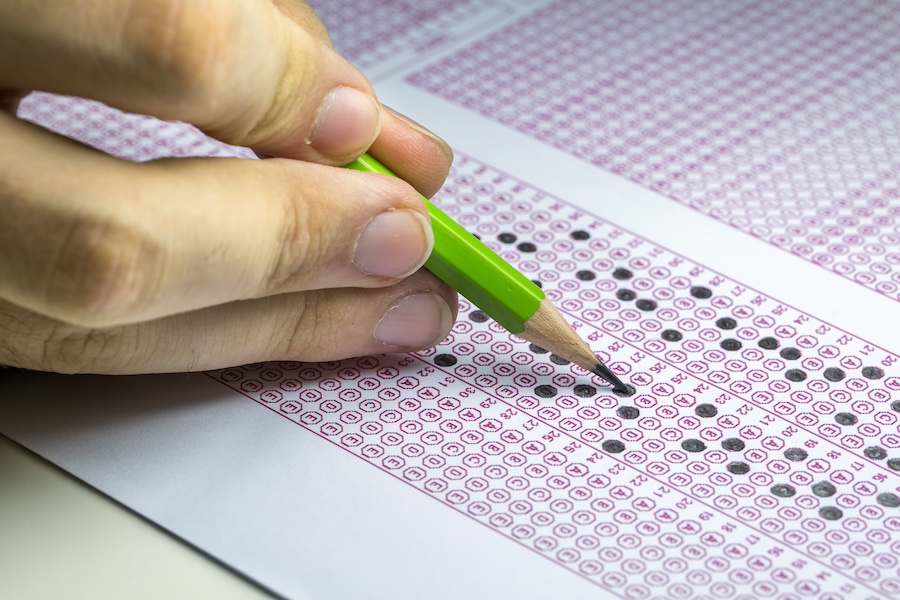The world of AP testing has recently been rocked by two concerning reports. The first is that a record number of AP test scores were canceled this year, the second is that AP scores are higher than ever across the board. Both of these incidents raise questions about the state of AP testing, its place in the college admissions process, and where things are going from here.
In this article, we’re going to examine these revelations, and explore how they will impact both current and future students. We’ll let you know what’s going on, and what the AP test plans to do about it. AP classes are an important part of high school for many students, and anything which disrupts that causes ripples of concern to spread outwards. Let’s get to the bottom of what’s going on, and how it will impact you.
What’s Happening with the AP Cheating Scandal
The first story, reported in the Times of Higher Education, is on a major AP cheating scandal which rocked the AP tests this year. A number of tests were leaked back in May, and testing materials made it onto the international black market. It turns out that it is much easier to do well on a test when you know exactly what questions are going to be asked ahead of time.
This was not the first cheating scandal that College Board has dealt with, but it did lead to a significant number of score cancellations for suspected bad behavior. No cheating reports were so widespread that entire countries suffered, but this was still far more pervasive than usually occurs during AP testing.
As a result of this, College Board is looking into new digital distribution methods for their tests. Their current method relies on mailing out thousands of paper exams weeks in advance to schools all over, making it easy for a single bad actor to gain access to testing materials.
The other reason the AP tests are in the news is a report by the Wall Street Journal bringing to light an interesting new trend; namely, that scores on AP tests are rising significantly in comparison to previous years. This means that more students than ever are receiving scores of 3 or above, entitling them to college course credit.
In some respects, this is great. Earning college credit early is one of the main appeals of AP tests, and more students earning this credit helps them tremendously. In other respects, this has raised important questions about the validity of the scores. AP tests are supposedly based on rigor; trying to equal the difficulty of a college course. While AP courses are nothing like college, they still have a reputation for difficulty, and any loss of this may cause colleges to reevaluate when and how they grant credit for participation in them.
So that’s what’s going on with the AP exams, but how will any of this impact you? These are interrelated issues, but we’ll handle each in turn, since the impacts are likely to be somewhat varied.
Cheating on AP Exams
As long as there are high stakes examinations, there will be those who try to cheat on them. This is a quirk of human nature, and one which we see in all kinds of testing scenarios, not just the AP exam. It is also the nature of those giving the exams to try to prevent this cheating, and we are seeing that now in how College Board is responding to this latest AP cheating scandal.
There has been a push to digitize these tests ever since Covid showed it was theoretically possible, and this latest leak is being used to further accelerate that timeline. It is true that digital tests do not have the same cheating and leaking vulnerabilities that physical tests do. This does not mean they are foolproof however.
The vulnerability of digital data depends on how secure the systems it is stored on are. As we have seen through myriad data leaks in the past, even impacting financial institutions and tech companies, just because something is stored digitally does not automatically make it secure.
Indeed, while digitizing the test makes some cheating methods more difficult, others become easier; it merely transforms the problem into a new form. The biggest issue they have is one they cannot address, and that is how the internet has made cheating a wide scale problem generally.
Prior to the internet, a single test getting leaked would have a very small impact, limited to only those students who could somehow physically gain access to that test. Now a leaked test can go online in minutes, bouncing between different corners of the globe. It is this increase in the ease of distribution which has led to a rise in cheating incidents, rather than any particular flaw in the AP tests’ delivery method.
A General Rise in AP Scores
While some students turn to less than honest methods to secure high scores, students across the board are seeing their scores increase when compared to previous years of testing. The given reason for this is that the AP tests have changed how they grade the tests, moving away from human judges and towards algorithmic grading systems. Every test they have done this on has seen corresponding increases in scores.
On its face, this is great news. Students stress all the time over these exams and their scores on them, and the additional chance to earn college credit will be very welcome for students. On the other hand, this may cause universities to question the validity of AP exams, and whether high scores are truly indicative of a student’s ability to do college level coursework.
While College Board claims their goal is not to merely increase the number of students scoring well, there are some who point to the growth of dual enrollment classes competing with AP classes as a possible reason for this change. While College Board is technically a nonprofit organization, they do act as a business in many ways, and competing with these classes for market share is something they are clearly concerned with.
As this expands to more tests, and permeates through the AP system, we will see if colleges reevaluate which scores are counted for credit. There are already many colleges which limit credit to students scoring a 4 or 5 (or only a 5), and this may expand significantly if more colleges believe that the AP tests have diluted their grading standards substantially. While this may help students in the short term, the long term consequences remain to be seen.
Root Causes and Consequences
While these are very different stories, the root causes and motivations of the actors at work are the same. Namely, as college admissions becomes more competitive, any way to gain an advantage in the admissions process becomes increasingly sought after. This has impacted any number of areas, and we observe the stresses it creates in students. This does not justify cheating of course, but does explain the student’s motivations and mindsets for doing so. You can empathize with an action without condoning it.
This parallels what we see in other high stakes testing scenarios; some countries turn off their entire internet to prevent cheating on college qualifying exams; after all when a single exam defines your whole future, you have a lot of incentives to make sure you do as well as you can on it.
The AP tests are not at this level yet of course. Nobody gets into college or is rejected based on the strength of their AP scores alone. But they are part of a larger trend, as the top colleges grow ever more competitive with their acceptance rates, and students become ever more stressed out about getting into one.
There is no easy solution to this, especially because the College Board benefits indirectly from this. After all, they run the AP and SAT exams, they enable most applications through the Common App, and they even enable financial aid applications through the CSS Profile. While they may not like how stressful and overwhelming the college application process has become for students, they are intrinsically entwined with the process as a whole, and benefit from every aspect of it.
It remains to be seen what the long term consequences of these news stories will be, but it’s clear that it isn’t getting any easier to apply to top colleges. The pressure on students to succeed is only increasing, which isn’t good for anybody involved, least of all them.
Final Thoughts
The AP tests have become a core component of high school for many students, and do offer some significant advantages. For more on this, and advice on which tests you should consider taking, see our article here. The point of this article is to explain why they’ve made the news recently and why there may be some problems associated with them that are not commonly commented on.
College applications are always going to be stressful; it’s the first step to the rest of your life after all. They don’t, however, have to be overwhelming or all consuming. If you feel overburdened by the prospect of applying to colleges, or are facing doubts about an upcoming AP test, then schedule a free consultation with us today to learn how we can help you. Applying to college is hard, yes, but you don’t have to do it alone.








